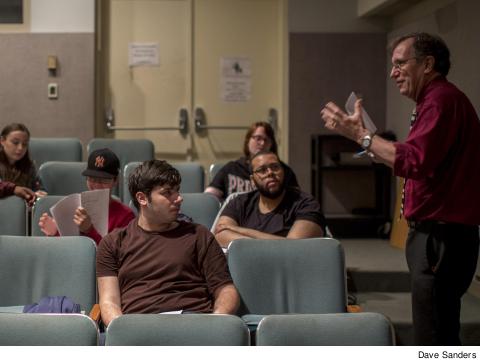Logging the hours part-timers work
 |
The union’s “Log Your Hours” project for adjuncts allowed participants to draw a clear picture of how their work is valued. More than 275 CUNY adjuncts charted the time it took them to grade, plan lessons, teach and guide students using an online and mobile application that tracks time. The application shows how much time it takes for adjuncts to actually get the work done. And the numbers are alarming.
After crunching the data, more than two in five adjuncts discovered they are paid less than $25 per hour. It is no secret that CUNY adjuncts are underpaid, but for many participants in the project, the ability to see their time delineated in hours and tasks was both revealing and depressing.
‘UNPAID’ HOURS
“While I was always aware of how much time I typically spend week to week on teaching-related activities, seeing it calculated and graphed into solid numbers gave me a much better sense of my actual ‘unpaid’ hours,” said Nicole Butterfield, an adjunct assistant professor of anthropology at John Jay College and one of the adjuncts who participated in the project.
The project has been useful at the bargaining table, where the PSC’s bargaining team is making the case for a transformational increase in adjunct pay from what is typically around $3,500 per course.
“We need every tool to fight for equal pay for equal work, and loggers’ records have helped to make adjunct labor more visible,” said Carly Smith, PSC first vice president for part-timers and a PSC bargaining team member. “The project reinforced the value of our work as adjuncts and we know the power our labor gives us.”
Adjuncts from every CUNY community and senior college and the Graduate Center participated in the logging project. For one month, during the Spring semester, participating adjuncts tracked their time. The hours tracked did not include prep time before the beginning of the semester, midterm crunch or finals – points in the semester when significant additional planning and grading occurs.
“I wanted to see it myself and I wanted the powers that be to see the numbers,” said Jeff Couchman, an adjunct assistant professor at the College of Staten Island who teaches screenwriting. Couchman found that he averaged 25 hours a week teaching one course. In order to develop students’ writing, he gives them a lot of one-on-one attention, which means a lot of reading, a lot of commenting and a lot of emailing students. Despite seeing the huge amount of work that he puts in, Couchman said he won’t hold back. To develop students’ writing it takes that much time and attention.
For adjuncts participating in the project, seeing the amount of time a task really takes was revealing. That email that they thought would only take five minutes took 15 in reality. Some said they began to limit tasks – answering emails only at specific times or grading for one hour each day. One adjunct who had already streamlined tasks still found herself working nearly 3.5 hours for each hour in class. The boundaries and shortcuts helped, but they didn’t solve the perennial CUNY problem of adjuncts feeling exploited.
‘SUBSIDIZING’ CUNY
Ruth Wangerin, who teaches anthropology at the College of Staten Island and Lehman College, became an adjunct after retiring from the New York City Department of Health and Mental Hygiene. With her pension and social security, along with her adjunct income, she can meet expenses and have one modest vacation each year.
“My pension is subsidizing CUNY,” Wangerin said. “I’m too old and too proud to be working for pennies, so I make sure that I limit how much work I’ll do for the money, unlike many of my colleagues who are either less experienced or less secure than I am.”
FINDING POWER
Daniel Mann, an adjunct lecturer at Queensborough Community College, said the project made him both feel powerless and recognize the power of being unified.
“Only if we are standing together can we accomplish anything,” said Mann. A couple of semesters ago, he noticed many adjunct instructors were forced to approach their classes with an assembly-line mentality. Even with all of this streamlining, Mann said that he makes around $15 an hour.
“I’m at the point now where I’m no longer willing to work for free,” Mann said. “I’m not going to give CUNY any more of my time for free than I have to.”
For Mann and the other adjuncts interviewed for this story, respect is paramount, and a decent wage is a sign of respect.
Mann is also an adjunct at Fordham, where he said he is treated better. He gets paid $5,000 per course (it will incrementally go up to $7,000, thanks to a recently settled union contract at that university), has an office and gets departmental support. In turn, Fordham students get more of Mann’s time, which for Mann, who is the third generation in his family to be a part of the CUNY community, is unfortunate.
“I do believe in what CUNY is about,” Mann told Clarion. “But CUNY needs to believe in itself and stop with this neoliberal corporatization.”
Mann added that CUNY was not living up to its mission of public service. “The university is not a business, and that’s what CUNY needs to realize,” he said.

